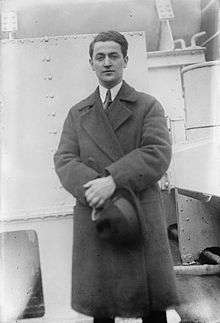Samuel Dushkin

Samuel Dushkin (December 13, 1891 – June 24, 1976) was an American violinist, composer and pedagogue of Polish birth and Jewish origin.
Dushkin was born in Suwałki, Poland. He studied at the Conservatoire de Paris as well as with Leopold Auer in New York City and Fritz Kreisler. He made his European debut in 1918 at the age of 23 and six years later his American debut with the New York Symphony Orchestra under Walter Damrosch.
Dushkin cooperated closely with Igor Stravinsky in the composition of the latter's first work for the violin, the Violin Concerto. He played at the concerto's world and US premieres and on the debut Vox recording (VLP 6340) with Stravinsky conducting Lamoureux Orchestra.
Stravinsky also composed his Duo Concertante and his Divertimento, both for violin and piano, to play with Dushkin in concert tours. They also worked together in violin transcriptions of other works, such as the Suite Italienne from Pulcinella.
Dushkin gave the premiere of Ravel's orchestral version of his Tzigane, in Amsterdam on 19 October 1924, with Pierre Monteux conducting the Concertgebouw Orchestra.[1]
Dushkin owned two Stradivarius violins, a Guarneri del Gesù violin and a Guadagnini violin.[2]
He published many arrangements and transcriptions for violin and piano, for example pieces by Isaac Albéniz, Georges Bizet, Rudolf Felber (1891-1978), George Gershwin, Paul Kirman, Modest Mussorgsky, Sergei Rachmaninoff, Igor Stravinsky, Henryk Wieniawski and other composers. They are published in "Samuel Dushkin Repertoire".[3] He was also the author of the "Grave for violin and orchestra by Johann Georg Benda", a musical hoax.[4]
His younger brother, David Dushkin, also studied music in America and Paris. David, along with his wife, Dorothy, founded the Music Institute of Chicago in 1931, as well as the Kinhaven Music School in 1952.[5][6]
Dushkin died in New York.
Notes
- ↑ Canarina, John. Pierre Monteux, Maître. Pompton Plains, New Jersey: Amadeus Press, 2003, p341.
- ↑ Cozio.com
- ↑ Birtel, Wolfgang, ed. (2008). Samuel Dushkin Repertoire. Mainz: Schott Music. ASIN B00385LJZ4. OCLC 605251001.
- ↑ Lebermann W. Apokryph, Plagiat, Korruptel oder Falsifikat? // Musikforschung XX (1967), S.413–25.
- ↑ "History". Kinhaven Music School. Retrieved 18 March 2016.
- ↑ "The Dushkins". Music Institute of Chicago. Retrieved 18 March 2016.
References
- "Samuel Dushkin" The Concise Grove Dictionary of Music. Oxford University Press, Inc., 1994
- Stravinsky, Igor (1958). An Autobiography. New York: M. & J. Steuer. pp. 165–168. Retrieved 12 February 2015. (Meeting with Samuel Dushkin)